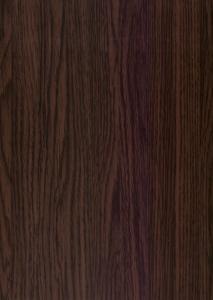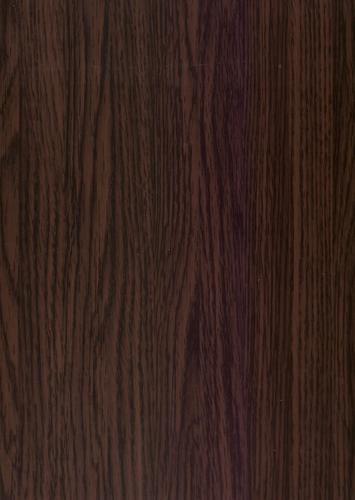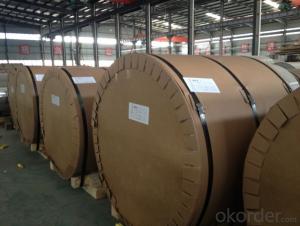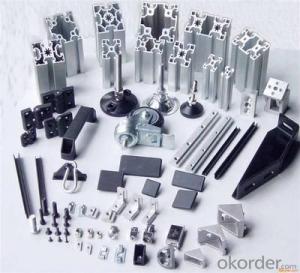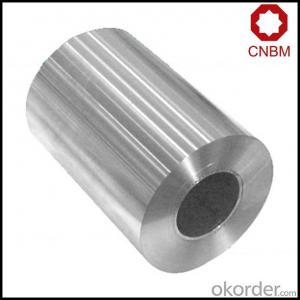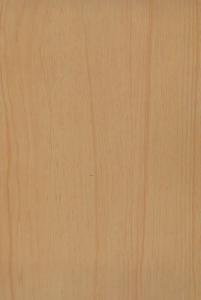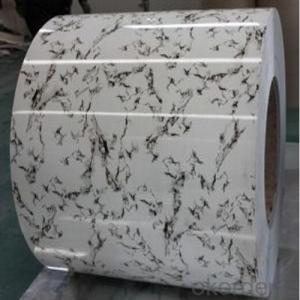Wood Grain Aluminum Coil Pipe
OKorder Service Pledge
OKorder Financial Service
You Might Also Like
Aluminium coated sheetand coil choose aluminium sheet coil as raw material, after de-ester, cleaning,passivation layer processing, and then painting on this basis, the paint areprovided by famous international companies like PPG and Valspar from UnitedStates or Becker from Sweden, represent the most advanced level in the world.After the test of exposure by natural light in Florida, the quality assurance is more than morethan 20 years. As poor performance of color coated steel corrosion, rust,yellow rust after a large amount of the deficiency of serious impact on thebuilding's overall appearance. However, because of the advantages of rawmaterials, Aluminium coated coil have a high strength, corrosion resistance,high weather resistance, can be used recycle, save energy and protect theenvironment and other characteristics. Not only have the same strength with colorcoated steel, but also overcome the shortage of color coated steel. So, the Aluminiumcoated coil has been widely used as roofing and ceiling decorative envelopesystem board in modern constructions like large factories, exhibition halls,stadiums, airports, train station hospital and so on. We can choose Aluminiumcoated coil in different thickness and color, by cutting, pressing, punching,bending and other follow-up molding process for large span, the larger theoverall roofing, wall decorative panels used in construction; or cut them intosmall panels by bending, stamping mold or other processing for indoordecorative roofing plate; we can also composite them with polyurethane foam oraluminium honeycomb for energy-saving decorative wall plates.
Alloy | 1050,1060,1100,3003,3004,3005,3104,3105,5052,5005,8011 |
Temper | O,H42,H44,H46,H48 |
Thickness (mm) | 0.25mm-1.5mm for aluminium coated coil; 1.50mm-4.0mm for aluminium coated sheet. |
Width (mm) | 100mm to 2000mm |
Length (mm) | 800mm to 6000mm for sheet |
- Q: How do aluminum coils contribute to the thermal conductivity of products?
- Aluminum coils play a vital role in enhancing the thermal conductivity of various products, thanks to their exceptional thermal properties. These coils, crafted from aluminum, excel at transferring heat with great efficiency. Compared to common metals like steel or copper, aluminum boasts significantly higher thermal conductivity. Consequently, when incorporated into products, aluminum coils swiftly and effectively move heat from one area to another. For instance, in air conditioning units, aluminum coils find frequent use in HVAC systems. As refrigerant courses through the coils, the aluminum material rapidly absorbs heat from the surrounding air. This process facilitates efficient cooling, swiftly removing heat from the air and expelling it, thereby creating a more comfortable indoor environment. Likewise, in heat exchangers, aluminum coils aid in the transfer of heat between two fluids or gases. The aluminum's strong thermal conductivity ensures efficient heat exchange, guaranteeing the desired temperature is reached promptly. Additionally, the lightweight nature of aluminum coils makes them easier to handle and install in a range of products. This characteristic proves particularly advantageous in industries such as automotive, aerospace, and electronics, where weight reduction is critical. In conclusion, aluminum coils make a significant contribution to the thermal conductivity of products by efficiently transferring heat, thanks to their impressive thermal properties. Furthermore, their lightweight nature enhances their versatility and practicality across multiple industries.
- Q: Can aluminum coils be used in electrical transformers?
- Yes, aluminum coils can be used in electrical transformers. Aluminum is often chosen as an alternative to copper due to its lower cost, lighter weight, and better thermal conductivity. However, aluminum coils may require larger sizes to achieve the same electrical performance as copper coils.
- Q: How do aluminum coils contribute to fire safety?
- Aluminum coils contribute to fire safety in various ways. First and foremost, aluminum is a non-combustible material, meaning it does not burn or support combustion. This makes it an excellent choice for applications where fire safety is paramount, such as in the construction industry. Aluminum coils are commonly used in the manufacturing of fire-resistant barriers and protective claddings. These barriers act as a shield, preventing the spread of flames and heat between different areas of a building. By containing the fire to its origin and preventing it from spreading, aluminum coils play a crucial role in limiting the damage caused by fires and ensuring the safety of occupants. Furthermore, aluminum coils are often used in the production of fire-resistant doors, windows, and curtain walls. These components are designed to withstand high temperatures and provide an effective barrier against the spread of fire and smoke. By using aluminum coils as the base material for these products, they can offer enhanced fire protection and help to prevent the rapid spread of flames in the event of a fire. In addition to being non-combustible, aluminum is also a highly conductive material. This property allows it to quickly dissipate heat, reducing the risk of ignition and minimizing the potential for fire accidents. Aluminum coils are often incorporated into heat exchange systems, such as HVAC units and refrigeration systems, where their thermal conductivity helps to regulate temperature and prevent overheating, thus reducing the risk of fire. Overall, aluminum coils contribute to fire safety by being non-combustible, acting as fire-resistant barriers, and being used in the production of fire-resistant doors and windows. Their ability to dissipate heat quickly also helps to minimize the risk of fire accidents. By utilizing aluminum coils in various fire safety applications, we can enhance the protection of buildings and ensure the safety of occupants in the event of a fire.
- Q: I have a aluminum sign that I store in the garage and it got a couple specks of rust on it which I don't like because I use it for my DJ shows. How can I get rid of the rust before it gets too bad without painting over it?
- Aluminum doesn't rust.
- Q: Can aluminum coils be used in the production of solar panels?
- Aluminum coils are indeed suitable for the production of solar panels. Being a lightweight and durable material, aluminum brings numerous advantages to the manufacturing process. Its high conductivity and exceptional thermal properties enable efficient dissipation of heat. Furthermore, aluminum exhibits resistance to corrosion, a vital characteristic for solar panels as they encounter diverse weather conditions. Moreover, the cost-effectiveness of aluminum makes it a favored option in the solar industry. By employing aluminum coils in solar panel production, the performance, durability, and cost-effectiveness of these panels are greatly improved.
- Q: What are the different surface textures available for aluminum coils?
- Aluminum coils offer a range of surface textures, each with its own distinctive qualities and uses. 1. Smooth: The smooth surface texture is a popular and versatile option for aluminum coils. It boasts a sleek and polished appearance, making it suitable for a wide array of applications, including architectural cladding, signage, and consumer electronics. 2. Stucco: Stucco texture involves embossing the aluminum coil to create a raised pattern reminiscent of small pebbles. This texture enhances the coil's durability, offering resistance against scratches and dents. It is often chosen for applications that require a robust and decorative finish, such as roofing, wall panels, and decorative trim. 3. Diamond: The diamond texture features an embossed diamond-shaped pattern on the aluminum coil's surface. This texture not only adds visual appeal but also provides enhanced traction and slip resistance, making it ideal for flooring, stairs, and ramps. 4. Brushed: The brushed texture is achieved by mechanically brushing the surface of the aluminum coil, resulting in a linear pattern. This finish gives the aluminum a distinctive satin-like appearance, making it sought after for architectural applications like interior wall cladding, furniture, and decorative elements. 5. Hammered: To create the hammered texture, the aluminum coil's surface is hammered, producing a unique and irregular pattern. This texture lends a rustic and handcrafted look, making it suitable for decorative accents, light fixtures, and furniture. 6. Perforated: The perforated texture involves puncturing small holes or perforations into the surface of the aluminum coil. This texture allows for increased airflow, light transmission, and sound absorption, making it commonly used in ventilation systems, acoustic panels, and decorative screens. These examples illustrate the various surface textures available for aluminum coils. The choice of texture depends on specific application requirements, including aesthetics, functionality, and durability.
- Q: Can aluminum coils be used for structural purposes?
- No, aluminum coils are typically not used for structural purposes as they lack the necessary strength and rigidity required for structural applications.
- Q: Are aluminum coils suitable for heat sinks?
- Yes, aluminum coils are suitable for heat sinks. Aluminum is a popular choice for heat sinks due to its excellent thermal conductivity and low cost. The high thermal conductivity of aluminum allows it to efficiently transfer heat away from a heat source towards the fins of the heat sink, where it can be dissipated into the surrounding environment. Additionally, aluminum is lightweight and easily formed into various shapes, making it a versatile material for heat sink applications. Overall, aluminum coils are a suitable choice for heat sinks, providing effective heat dissipation and cost-effectiveness.
- Q: What are the various techniques used in the manufacturing process to create insulation for aluminum coils?
- <p>Aluminum coil insulation is produced using several methods, including lamination, extrusion, and coating. Lamination involves stacking thin sheets of aluminum with insulating material between them. Extrusion is a process where aluminum and insulation materials are pushed through a die to create a continuous profile. Coating methods apply a layer of insulating material directly onto the aluminum coil surface. These methods ensure the insulation maintains its properties under varying conditions, providing electrical isolation and protection against environmental factors.</p>
- Q: This question asks for the cost of a set of aluminum coils.
- <p>The cost of a set of aluminum coils can vary significantly based on factors such as the current market price of aluminum, the size and thickness of the coils, and the quantity being purchased. As of my last update, the price of aluminum fluctuates with the global commodities market, and it's best to check with suppliers or on metal exchange platforms for the most accurate and up-to-date pricing. For specific projects, you might need to contact aluminum suppliers directly to get a quote tailored to your requirements.</p>
Send your message to us
Wood Grain Aluminum Coil Pipe
OKorder Service Pledge
OKorder Financial Service
Similar products
Hot products
Hot Searches
Related keywords
